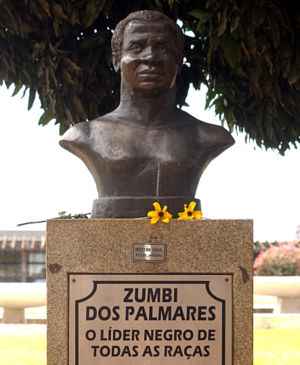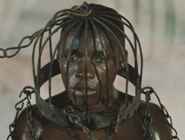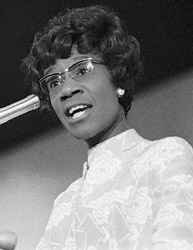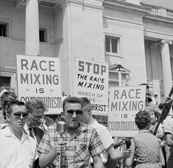Films

Plus Q and A with Charlie Phillips
Saturday 26 April 2-5.15pm
Museum in Docklands,
West India Quay (Docklands Light Railway)Free entry: first come,first served Please bring a donation
www.museumindocklands.org.uk
Brazil has the highest black population after Nigeria. Many people there still speak Yoruba or Angolan dialects and practice traditional African forms of worship. Although the British like to say they abolished the slave trade in 1807 they forget to mention they were supplying kidnapped Africans wholesale to the Portuguese who did not abolish slavery until 1888.
This multi award winning film by Zozimo Bulbul shows where and how black people fought for their freedom using art, culture, dance, religion, carnival and armed resistance.
Charlie Phillps is a renowned photographer/film maker who has lived and worked in Brazil,Italy,Sweden and Germany. He will be sharing his experience of 50 years of fighting racism and his inside knowledge on the African-Brazilian experience.

Saturday 19 April 1pm-5.30pm
BFI Southbank (near Royal Festival Hall) Belvedere Road SE1
Tube: Waterloo.Admission £5.00 Box office 0207 928 3232 www.bfi.org.uk
When films are powerful and challenge the status quo they are often banned or suppressed. It is not an accident that positive black films are put on TV at 11.20pm or that African cinema releases are never adequately promoted.
Most films on slavery skim over the realities of what Europeans did to force Africans to work for nothing all day long. This film does not. It is so unflinching in its portrayal of European barbarity during slavery that it has effectively been witheld from audiences for 35 years for fear of the reaction it would get .
Made in the aftermath of the US civil rights movement the film puts the 1970's fight for equality into context by using a documentary style to see exactly what life would have been like for enslaved Africans on the plantations of the USA and the legacies of such behaviour on present day society. The film was condemned as racist, ridiculous and unrealistic when it was released but much of the dialogue and events were based on historical letters and documents that are now readily available via the internet or in print.
This film has been screened in a British mainstream cinema only once before and sold out. It will be followed by discussion with historians, academics and community activists. This landmark event is brought to you in collaboration with:
100 Black Men
Pan Afrikan Society LSBU
Images of Black Women Film Festival
Ligali
Black Nine Films
Black Filmmakers Magazine

Saturday 12th April 2pm-5.00pm
Conference Room, Imperial War Museum, Lambeth Road SE1 Tube: Lambeth North.
www.iwm.org.uk Free entry: First come,first served Please bring a donation
Ghosts of Rwanda (PBS Frontline documentary)
Whether you've seen or missed Hotel Rwanda this film is a must to get a comprehensive understanding of the Rwandan genocide and the links between
Somalia, Rwanda, Sudan and racism at the United Nations. The film also highlights African heroes such as the Senegalese peacekeeper Captain Mbaye Diagne who saved countless lives by repeatedly driving into enemy lines.
Question and Answer with the director, Greg Barker. for a full breakdown of this astonishing film visit
http://www.pbs.org/wgbh/pages/frontline/shows/ghosts/
Saturday 5th April 1pm-5.00pm
Conference Room, Imperial War Museum, Lambeth Road SE1www.iwm.org.uk
Free entry: First come,first served. Please bring a donation
This event is always ram-off to see why click http://uk.youtube.com/watch?v=dmUVXGfJ4Yc
In association with Inspired Black Women we present three films and workshops on the history and legacy of the beauty of black women. Films include:
Sisters on the Light/Dark Thing (beauty)
Black, Bold and Beautiful (hair)
Yellow Babes (skin)
We will also have reports on the experiences of Black British women in Senegal, Somalia and Norway and men will be asked as to what they find attractive in women.


Plus Who was Carter G Woodson ? Plus, Black Power and the Vietnam War
Sunday 30 March 1pm-5.30pm
Imperial War Museum, Lambeth Road SE1, Tube: Lambeth North. www.iwm.org.uk Free entry: First come, first served Please bring a donation
While the media focus on Barack Obama they forget to mention that the first black person to run for President was Shirley Chisholm in 1972. Chisholm was the Garveyite daughter of Guyanese and Barbadian immigrants. After becoming the first black Congresswoman,she ran for the highest office just 4 years after King was gunned down. Her story is incredible but has been suppressed.This is only the 4th time this film has been screened
The Vietnam war was going on at the same time as the Civil Rights movement. This presentation will look at how the US and French governments were able to get black people to fight in a war for "freedom" when they were seen as less than human in their own countries.
